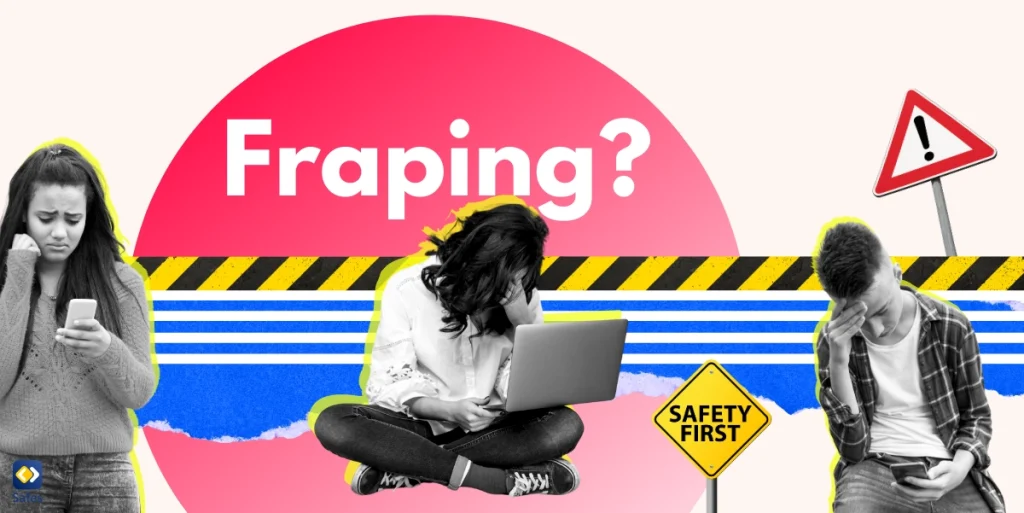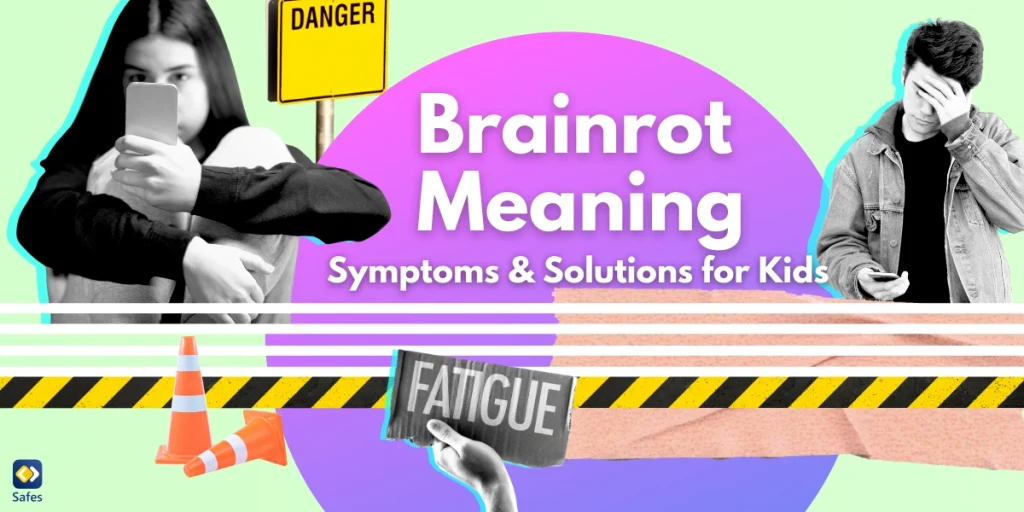Kids and teenagers spend a lot of time on social media. It’s a place where they can connect with friends, share photos, and express themselves. However, there’s a prank called “fraping” that can turn social media into a source of stress and embarrassment for them. Fraping happens when someone gets into another person’s Facebook account and changes things around without permission. They might post silly or mean messages, change the profile picture, or mess with other settings. While some people think it’s just a joke, it can be really upsetting for the person whose account gets fraped. This is the fraping definition.
Download and Start Your Free Trial of the Safes Parental Control App
In this blog, we’ll explain what fraping is in simple terms and give you some tips on how to protect your child from it. But first, let’s make sure you know exactly what fraping is all about.
What Is Frapping?
Fraping is a term that combines the words “Facebook” and “rape,” and it refers to the act of altering someone else’s Facebook account without their permission. This is usually done as a prank in which one may post statuses, send messages, or change the profile details of the owner to embarrass them.
Although often intended as a joke, fraping can be distressing for the victim and is considered a violation of privacy and trust. It’s important to remember that accessing someone else’s account without permission, regardless of the intent, is a serious issue and can have legal and social consequences.

What Is the Example of Fraping?
Imagine your child leaves their Facebook account logged in on a shared family computer. While they’re away, their older sibling or a friend decides to play a prank. They access the account and post a status update like, “I have a huge crush on my math teacher!” They might also change the profile picture to something silly or embarrassing, like a baby photo or a goofy meme.
When your child returns and sees what has been posted, they feel embarrassed and upset. Their friends might see the post and start teasing them, not realizing it was a prank. This is a typical example of fraping, where someone uses another person’s Facebook account without permission to cause embarrassment or trouble.
What Are the Consequences of Fraping?
Fraping might seem like a harmless joke to some, but it can have several serious consequences. For one, the victim of fraping can feel embarrassed, upset, or humiliated. This can lead to anxiety, loss of self-esteem, and a feeling of betrayal, especially if the fraping was done by a friend or family member. Moreover, inappropriate or offensive posts made during a frape can harm the victim’s reputation. Friends, family, and even potential employers who see the posts might get the wrong impression of the victim.
Fraping is a violation of personal privacy. It involves accessing someone’s private information without their consent, which is a serious breach of trust. This action, in some cases, can lead to legal consequences. Unauthorized access to someone’s social media account can be considered a form of cybercrime, and the perpetrator could face legal action.
Moreover, an article by Karen Lumsden and Heather May Morgan suggests other consequences of fraping that are explained below:
- Normalization of Insensitive Language: The term “fraping” and the actions related to it can become common in everyday talk, often discussed without much thought. This can make people less aware of the emotional harm and privacy issues involved.
- Public Victim, Anonymous Perpetrator: The person who gets fraped is publicly shamed, while the person who does it can stay anonymous. This means the victim often gets no real justice, and the perpetrator faces no significant consequences.
- Victim-Blaming: Fraping can be similar to blaming victims in cases of sexual assault and cyber harassment. Victims of fraping are sometimes blamed for leaving their accounts unprotected, just as sexual assault victims might be unfairly blamed for their appearance or behavior.
How to Protect My Child Against Fraping?
Protecting your child against this disturbing prank requires constant monitoring of your child’s online activities, educating them, strengthening their privacy, and securing on social media. Here’s what you need to know to stop and prevent fraping.
Educate Your Child
Explain what fraping is and why it’s a serious issue for your child. Then, make sure they understand that it’s not just a harmless prank and can have real emotional and social consequences. You should also encourage them to be mindful of their online behavior and interactions. Remind them that what they post and how they manage their accounts can impact their digital footprint and privacy.
It’s important to maintain open lines of communication with your child. Assure them that they know they can come to you if they experience or witness fraping or any other online issues.
Use Strong Security and Privacy Settings
Using strong, unique passwords for your kid’s social media accounts can be beneficial in keeping them safe from fraping. A good password should be long, include a mix of letters, numbers, and symbols, and avoid obvious choices like birthdays or pet names. Also, learn how to turn on 2-factor authentication on Facebook to add an extra layer of security. Even if someone gets hold of your child’s password, they won’t be able to access the account without the second form of verification.
Another important factor is to review and adjust their privacy settings on social media. They can control who sees their posts and who can send them friend requests. It’s a good practice to limit these to people they know and trust.
Report and Block
Prankers are everywhere. Teach your child how to report and block anyone who attempts to frape them. Social media platforms have mechanisms for reporting inappropriate behavior and protecting users.
Use Parental Controls
Even though there are built-in parental controls on the platform itself, like Macbook parental controls, you can use other similar apps to monitor and manage your child’s online activity. These tools can help you set limits on screen time, restrict access to certain apps or websites, and receive alerts about unusual or potentially harmful activity. You can either learn how to put parental controls on Facebook or use a comprehensive app to monitor your kid’s phone altogether. In that case, you can benefit from our parental control app, Safes. This app allows you to monitor and manage your child’s online activity, offering every feature you need to make sure your beloved child is safe online.

Final Word
Fraping is more than just a prank; it’s a serious issue that can have lasting emotional and social consequences for your child. Now that you know the fraping cyberbullying definition you can implement strategies to protect against it and help safeguard your child’s online presence. To further enhance your child’s online security, feel free to start using Safes today. Our app is available for both Android and iOS devices, and we offer a free trial so you can experience all the features and benefits firsthand.
Your Child’s Online Safety Starts Here
Every parent today needs a solution to manage screen time and keep their child safe online.
Without the right tools, digital risks and excessive screen time can impact children's well-being. Safes helps parents set healthy boundaries, monitor activity, and protect kids from online dangers—all with an easy-to-use app.
Take control of your child’s digital world. Learn more about Safes or download the app to start your free trial today!




